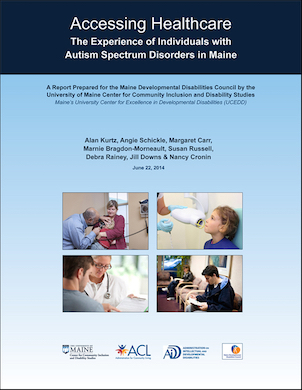ME UCEDD, NH LEND Faculty and Trainees, and Maine DD Council Collaborate on Research Report on Healthcare Access for Individuals with ASD in Maine
April 10, 2015

|
| Image: Accessing Healthcare: The Experience of Individuals with Autism Spectrum Disorders in Maine (report cover) |
Previous research has revealed that children and adults with autism spectrum disorders (ASD) are significantly more likely to have both unmet healthcare needs than those with other disabilities. In addition, they are more likely to have difficulty accessing primary or specialized medical care. Minority status, living in a rural location, and low income can exacerbate these disparities.
The University of Maine Center for Community Inclusion and Disability Studies, Maine's University Center for Excellence in Developmental Disabilities (UCEDD) and also a NH LEND program partner; recently collaborated with the Maine Developmental Disabilities Council on a research report, Accessing Healthcare: The Experience of Individuals with Autism Spectrum Disorders in Maine (2014). The report reveals promising positive trends, as well as areas of concern, in healthcare access for children and adults with autism spectrum disorders in Maine.
The Maine Developmental Disabilities Council funded this research to collect information about the experience of accessing healthcare from 85 parents of children with ASD and 22 adults with ASD or their guardians who live in Maine. A consultant conducted structured in-person interviews to collect the data. Alan Kurtz, ME UCEDD Coordinator of Education and Autism Initiatives and NH LEND faculty member, analyzed the method, data collected, and reported the results. Final report co-authors include Angie Schickle, Margaret Carr, Marnie Bragdon-Morneault and Debra Rainey (2012-2013 NH LEND trainees), Susan Russell (LEND Training Coordinator at the University of Maine), Jill Downs and Nancy Cronin.
The report reveals a number of promising positive trends in healthcare access for individuals with autism spectrum disorders in Maine:
· A much earlier median age of identification and diagnosis among the youngest cohort of children;
· High ratings of overall health and healthcare;
· Overall satisfaction with primary care providers;
· High rates of satisfaction with the ability of the medical provider to meet the patient and family's individual needs;
· High ratings of medical providers' understanding of ASD;
· Relatively little difficulty finding a provider; and
· Access by most patients with ASD to routine care and screening.
The report also points to some areas of concern in healthcare access for individuals with autism spectrum disorders in Maine:
· Poor communication among some medical providers;
· Failure of medical practices to make requested accommodations, especially those related to difficulty in waiting rooms;
· A very high rate of gastrointestinal issues and the frequent failure of medical providers to notice or act upon a possible relationship between gastrointestinal issues and behavior;
· A lack of communication between families and medical providers about using alternative therapies;
· A general lack of planning related to the transition from pediatric to adult healthcare; and
· Difficulties that some patients had with completing routine care and screening procedures or in communicating that they are in pain or ill.
A current NH LEND trainee at the University of Maine is working with the Maine Developmental Disabilities Council to build on this work. The trainee is helping to design and pilot test a research protocol designed to examine access to healthcare by Maine children with special healthcare needs.
The full text of this research report (PDF) is available online at the University of Maine Center for Community Inclusion and Disability Studies' website.
Funding for the survey data analysis, research, and the compilation of this report was provided through a subcontract with the Maine Developmental Disabilities Council. Additional funding support was provided by the U.S. Department of Health and Human Services, Administration for Community Living, Administration on Intellectual and Developmental Disabilities, Grant No. 90DD0005.







